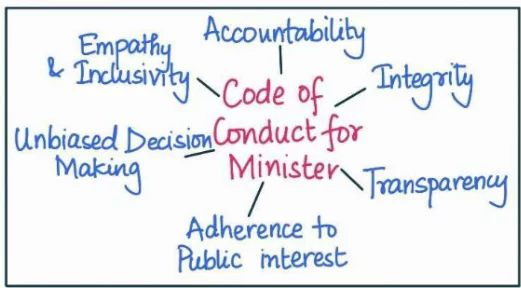Answer:
|
How to approach the question
- Introduction
- Write about Code of Ethics for ministers briefly
- Body
- Write the significance of the proposed Code of Ethics for ministers as recommended by the 2nd ARC.
- Write the concerns and challenges associated with the implementation of Code of Ethics for ministers.
- Conclusion
- Give appropriate conclusion in this regard.
|
Introduction
The 2nd ARC recommended a Code of Ethics for ministers, which is a set of ethical guidelines and principles that govern the conduct, behavior, and responsibilities of ministers, ensuring accountability, integrity, transparency, and adherence to public interest in their actions.
Body
Significance of the proposed Code of Ethics for ministers as recommended by the 2nd ARC
- Accepting responsibility for decisions taken: The Code emphasizes the ethical principle of accountability, requiring ministers to take ownership of their decisions rather than shifting blame onto others or incorrect advice.
- Separating roles as a minister and constituency member: This code separation of role as minister and constituency member, promoting integrity and avoiding conflicts of interest.
- Upholding political impartiality of civil service: The code expects ministers to ensure fair treatment, non-discrimination, and unbiased decision-making, fostering public trust in the political system.
 Upholding Integrity: The code ensures ministers adhere to ethical standards, enhancing public trust in the government.
Upholding Integrity: The code ensures ministers adhere to ethical standards, enhancing public trust in the government.
- Transparency and Accountability: It promotes transparency by requiring ministers to disclose their financial interests and assets. For example, a minister’s financial disclosures can be scrutinized to ensure they are not engaging in any illicit activities.
- Impartial Decision-Making: It emphasizes impartiality, compelling ministers to make decisions based on merit and public interest rather than personal biases. Like, a minister should not favor friends or family members in awarding government contracts.
- Promotion of Good Governance: It facilitates good governance practices, such as effective policy implementation, citizen participation, and responsiveness to public needs. An enlightened minister would prioritize these principles over personal gains.
- Conflict Resolution: It encourages ministers to resolve conflicts through dialogue and negotiation rather than resorting to unethical means. As an enlightened minister would engage in constructive discussions with stakeholders to address contentious issues.
- Empathy and Inclusivity: Ethical behavior outlined in the code fosters empathy towards marginalized groups and promotes inclusive policies. An enlightened minister would champion social justice and equal opportunities for all citizens.
- Respect for Human Rights: The code highlights the importance of respecting human rights in policy formulation and implementation. For example, an enlightened minister would ensure that legislation protects civil liberties and fundamental rights.
- Environmental Responsibility: The code underscores the significance of environmental sustainability in decision-making. An enlightened minister would prioritize environmentally friendly initiatives.
- Strengthening Democracy: The code contributes to the overall strengthening of democracy by promoting ethical behaviour in ministers. It ensures that the government serves the best interests of the people and upholds democratic principles.
Concerns and challenges associated with the implementation of Code of Ethics for ministers
- Lack of Enforcement: Despite having ethical guidelines in place, enforcing them effectively can be difficult due to political influence. For instance, if a minister is involved in a conflict of interest, it may be challenging to hold them accountable.
- Subjectivity and Interpretation: Different individuals may have contrasting views on what constitutes ethical behavior. For example, accepting gifts from lobbyists might be seen as unethical by some, while others may argue it is a common practice.
- Political Interference: This interference can undermine the integrity of the code and prevent its effective implementation. For instance, a ruling party may shield a minister accused of corruption.
- Lack of Transparency: Without transparency, it becomes difficult for citizens to assess whether ministers are abiding by the ethical standards. This can erode public trust and confidence in the government.
- Conflicts of Interest: Resolving such conflicts impartially can be a significant challenge. For example, a minister who owns shares in a company may be tempted to make policy decisions favoring that company.
- Lack of Oversight: Establishing an independent oversight body to monitor the implementation of the Code of Ethics is essential. However, challenges may arise in ensuring the independence and effectiveness of such bodies.
- Media and Public Scrutiny: While media pressure can expose unethical behavior, it can also become a tool for political rivals to make baseless accusations, damaging reputations and impeding fair implementation.
- Cultural and Regional Differences: Different regions may have unique ethical perspectives, and harmonizing them can be complex. For instance, what is considered acceptable behaviour in one region may be seen as unethical in another.
Conclusion
Addressing these concerns and challenges through comprehensive guidelines, robust enforcement mechanisms, and public participation is crucial to ensure the effective implementation of a Code of Ethics for ministers in India promoting an enlightened democracy.
To get PDF version, Please click on "Print PDF" button.
 Upholding Integrity: The code ensures ministers adhere to ethical standards, enhancing public trust in the government.
Upholding Integrity: The code ensures ministers adhere to ethical standards, enhancing public trust in the government.
Latest Comments